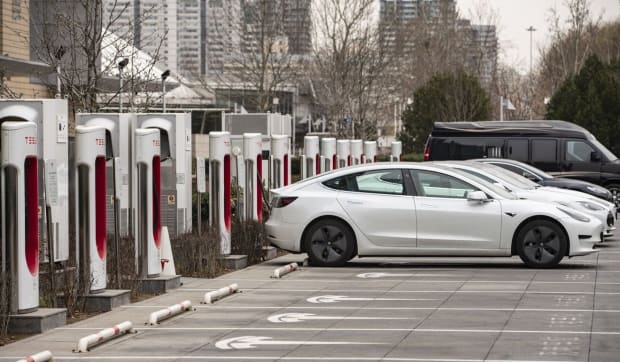The attractions of electric vehicles have been magnetic in 2022.
Soaring gas prices, inflation not seen in four decades and a push for cleaner, environmentally friendly technology have all combined to make EVs more appealing than ever to consumers.
Now, there is legislation headed toward the home stretch that will give EVs not only new legitimacy in the eyes of the auto market, but potentially lucrative perks to automakers and consumers who decide to bet on electric vehicles as their chosen mode of transportation -- and investment.
The new climate bill passed by the Senate on Aug. 7 is now headed to a vote in the House.

So What Can Consumers Expect in the Climate Bill?
If lawmakers make it official, the legislation is chock full of rebates, tax deductions, subsidies and incentives to move everything from their house’s power source to their toaster to a more climate-friendly energy source.
“This climate spending includes $60 billion for solar panel and wind turbine manufacturing (and $30 billion in credits for new projects), $60 billion for disadvantaged communities that bear the brunt of climate impacts, $27 billion for clean tech R&D, $20 billion to reduce agricultural emissions, $5 billion for forest conservation, $4 billion for drought funding in Western states, new battery manufacturing credits and many more climate-related priorities,” EV site Elektrek reports.

What Do You Get For Your Electric Vehicle in the Climate Bill?
It also includes a 30% tax deduction for homeowners who install solar energy at their homes, and a variety of financial perks for switching to the electric versions of household appliances, tech used for running a business and even cars.
It is that last one that has investors sitting up to take notice.
Both new and used electric vehicles will be eligible for tax credits, up to $7,500 for new cars, and $4,000 for use ones. The bill also ends the 200,000 cap on the number of cars that can be sold by a manufacturer that qualify for rebates. That's good news for Tesla (TSLA), which reached the cap long ago. But the flip side is that the bill limits the rebates to lower priced vehicles and families with relatively low incomes, so many high-end cars and trucks won't qualify.
While electric vehicles have been gaining popularity at a scorching pace as gas prices have pushed some drivers into the market – some estimates say interest in EVs has soared by as much as 60% since January 2022 – there is still a lack of inventory in the space.
That data comes from Recurrent, which took a deep dive look at a market that was worth $163 billion in 2020 and is projected to be worth $824 billion by 2030.
There Will Be A Lot More EV Competition Soon
That is slated to change. An earlier report from the Environmental Defense Fund outlined just how far automakers are looking ahead.
It found that over a dozen carmakers in America have rolled out plans to open EV manufacturing sites, spending $75 billion in six new states nationwide.
That is in addition to the $515 billion global auto companies are spending to build electric vehicles by 2030, when more than 100 new EV models are expected to be on the market, the report found.
Even tech darling Apple (AAPL) — which has fans who are arguably as rabid as Elon Musk's Tesla (TSLA) — appears to be getting ready to debut its own electric vehicle.







